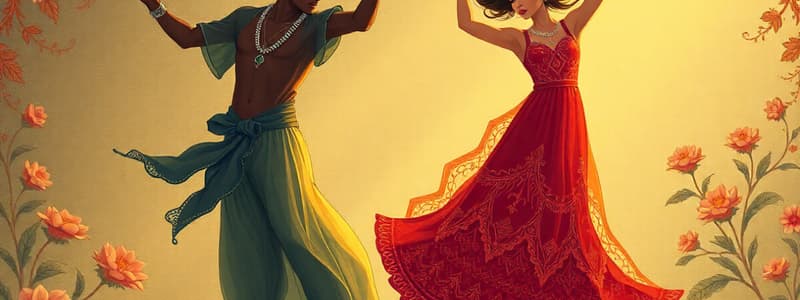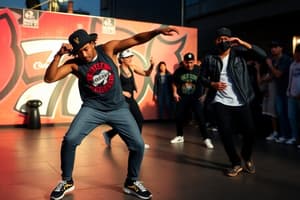Podcast
Questions and Answers
What does the word "hep" mean?
What does the word "hep" mean?
current
Who is known as the Grandfather of Hip-hop?
Who is known as the Grandfather of Hip-hop?
Kevin Donovan (Afrika Bambaataa)
Hip-hop music originated in the 1980s.
Hip-hop music originated in the 1980s.
False (B)
What was the primary reason young people in the 1970s and 1980s were drawn to hip-hop?
What was the primary reason young people in the 1970s and 1980s were drawn to hip-hop?
Hip-hop dancing is only practiced in dance studios.
Hip-hop dancing is only practiced in dance studios.
When did Philippine street dance gain widespread popularity?
When did Philippine street dance gain widespread popularity?
Who is considered a pioneer of street dance in the Philippines?
Who is considered a pioneer of street dance in the Philippines?
What was the name of the first Philippine team to win the World Hip Hop Dance Championships?
What was the name of the first Philippine team to win the World Hip Hop Dance Championships?
Hip-hop dance is only practiced indoors.
Hip-hop dance is only practiced indoors.
Which of these is NOT a fundamental characteristic of Hip-hop?
Which of these is NOT a fundamental characteristic of Hip-hop?
Krumping is a hip-hop dance style that emphasizes releasing anger.
Krumping is a hip-hop dance style that emphasizes releasing anger.
Match the hip-hop dance styles with their descriptions:
Match the hip-hop dance styles with their descriptions:
Cheer dance emerged in the 1970s.
Cheer dance emerged in the 1970s.
Cheerleading originated in the United States.
Cheerleading originated in the United States.
Cheerleading was initially a female-dominated activity.
Cheerleading was initially a female-dominated activity.
What are the two hands positions when standing in the "Beginning Stance"?
What are the two hands positions when standing in the "Beginning Stance"?
What is the difference between the Beginning Stance and the Cheer Stance?
What is the difference between the Beginning Stance and the Cheer Stance?
What is the name of the hand position when both arms are extended to the side in cheer?
What is the name of the hand position when both arms are extended to the side in cheer?
What is the name of the hand position where one arm is extended straight to the side and the other is bent, as if in a punch?
What is the name of the hand position where one arm is extended straight to the side and the other is bent, as if in a punch?
What is a herkie?
What is a herkie?
The Hurdle cheer dance move involves jumping into the air and landing in a herkie position.
The Hurdle cheer dance move involves jumping into the air and landing in a herkie position.
Describe the steps involved in performing a Forward Roll.
Describe the steps involved in performing a Forward Roll.
What is the difference between a Forward Roll and a Backward Roll?
What is the difference between a Forward Roll and a Backward Roll?
A Cartwheel involves rolling over your back.
A Cartwheel involves rolling over your back.
Cheer dance is relatively new in the field of sports.
Cheer dance is relatively new in the field of sports.
Cheer dance involves a combination of dance and gymnastics techniques.
Cheer dance involves a combination of dance and gymnastics techniques.
How long do cheer dance routines typically last?
How long do cheer dance routines typically last?
What is the purpose of cheer dance?
What is the purpose of cheer dance?
Flashcards
Hip-hop dance origin
Hip-hop dance origin
Developed in 1970s NYC among young Hispanic and African-American communities.
Hip-hop dance popularity
Hip-hop dance popularity
Gained popularity in the 1980s due to media exposure.
Hip-hop dance purpose
Hip-hop dance purpose
A creative outlet for venting frustrations and disappointments with society.
Hip-hop dance evolution
Hip-hop dance evolution
Signup and view all the flashcards
Street dance introduction (Philippines)
Street dance introduction (Philippines)
Signup and view all the flashcards
Philippine Hip-hop dance pioneers
Philippine Hip-hop dance pioneers
Signup and view all the flashcards
Hip-hop dance characteristics
Hip-hop dance characteristics
Signup and view all the flashcards
Hip-hop dance elements
Hip-hop dance elements
Signup and view all the flashcards
Hip-hop dance styles
Hip-hop dance styles
Signup and view all the flashcards
Breaking (Breakdancing)
Breaking (Breakdancing)
Signup and view all the flashcards
Popping
Popping
Signup and view all the flashcards
Locking
Locking
Signup and view all the flashcards
Krumping
Krumping
Signup and view all the flashcards
Tutting
Tutting
Signup and view all the flashcards
House Dance
House Dance
Signup and view all the flashcards
Cheer dance
Cheer dance
Signup and view all the flashcards
Cheer dance origin
Cheer dance origin
Signup and view all the flashcards
Cheerleading history
Cheerleading history
Signup and view all the flashcards
Study Notes
Hip-Hop Dance
- Derived from the word "hep", an African-American vernacular English term since 1904, meaning "current"
- Invented by Kevin Donovan (known as Afrika Bambaataa), who is considered the Grandfather of Hip-Hop
- Developed from the music of the 1970s in New York City among young Hispanic and African-American communities
- Became popular in the 1980s due to media exposure of hip-hop dance groups in America
- Young people created hip-hop as a creative outlet to express their frustrations with society
Hip-Hop Dance Styles
- A combination of various dancing movements and acrobatics
- Freestyle in nature and can be performed in dance studios or outdoors
- Four fundamental characteristics: rapping (MCing), DJing, breakdancing (B-boying), and Graffiti Art (Aerosol Art)
- Characterized by bounce, recoil, tightening of the body, agility, coordination, and fun
- Categories: Old School (breaking, popping, and locking) and New School (house, krumping, and street jazz)
Breaking (Break Dance)
- Explosive and acrobatic movements with breaks or freezes in between
- Holding the movement position for seconds before moving to the next
Popping
- Quick contraction and relaxation of muscles to produce jerking of various joints
Locking
- Involves acrobatics and physically demanding moves like landing on one knee or the split
- Other moves include waving arms, pointing, walking, stationary positions, and grabbing/rotating a cap or hat
Krumping
- A dance style used to release anger
- Characterized by unrestricted, rapid, and highly energetic moves of limbs
Tutting
- Imitates the angular poses seen in ancient Egyptian arts
House Dance
- A combination of skating, stomping, and shuffling moves
Cheer Dance
- A physical activity combining various dance genres and gymnastics skills like tumbling, pyramids, and tosses
- Routines range from one to three minutes
- Performed to motivate sports teams or in cheer dance competitions
- Relatively new in the sports field and emerged in the 1990s as part of cheerleading events
Cheerleading History
- Closely linked to the history of sports in the United States, sporting venues, and crowd participation events
- Origins trace back to the late 19th century, with students in Great Britain cheering for athletes at sporting events
- Cheerleading was primarily an all-male activity for the first 25 years
- Women joined as cheerleaders in the 1920s
Cheer Dance Fundamental Movements
- Beginning Stance: Feet together, hands down by the side
- Cheer Stance: Feet more than shoulder-width apart, hands down by the side
- Bucket: specific arm position
- Blade: specific arm position
- Jazz Hands: specific arm position
- Candlestick: specific arm position
- Clap: clapping movement
- Clasp: clasping movement
- Tabletop: arms bent at the elbow, fists in front of shoulders
- High V: arms extended upwards forming a "V", relaxed shoulders
- Low V: arms extended downwards forming a "V"
- Touchdown: arms extended upwards, parallel to each other, fists facing in
- T Motion: arms extended straight, parallel to the ground
- Diagonal: one arm in a high "V", the other in a low "V"
- L Motion: one extended arm to the side, other extended
- Overhead Clasp: Arms straight up in a clasp position slightly in front of the body's face
- Front Lounge: lead leg bent at the knee over the ankle, back leg straight, feet perpendicular to each other
- Side Lounge: lead leg bent at the knee over the ankle, feet perpendicular to each other
- Feet Apart: stride position with both feet away from each other, hands placed on the waist or clasped in front
- Jogging: moving with a light touch on the ground, where the ball of the foot hits first followed by the toes pointing downward
- Herkie: involves a series of arm and leg movements
- Toe Touch: jump and touch toes
- Hurdle: sharp, quick motion tiptoe jump, bringing one foot in front.
- Forward Roll: squat, place hands on floor, tuck chin, push off legs, rolling forward, legs against chest, arms in front, Get Up
- Back Roll: starting from the beginning stance, squat while facing backwards, laying hands on the floor, tuck chin and lift off (hands and legs), roll backwards, squat on chest and hold arms in front, stand up.
- Cartwheel: lead leg forward, arms extended, move whole body forward and raise back leg, kick back, once the hands hit the ground
Studying That Suits You
Use AI to generate personalized quizzes and flashcards to suit your learning preferences.





